 Headline News
Headline News

Two charged with conspiracy in missing person case
 (CNS): A 31-year-old man and a 29-year-old woman have been charged with conspiracy to pervert or defeat the course of justice in connection with a missing person’s case. Guyanese national Hemerson Raymond Gonzalez has been missing since Tuesday, 11 December, when he disappeared while visiting friends in the Cayman Islands. The 31-year-old man was said to be a regular visitor to the jurisdiction and was staying at an address in Canyon Dawn Drive, Savannah. Following his disappearance two women were arrested in January; one 25-year-old woman was arrested at that address on drug offences and a 19-year-old woman was arrested in Prospect on suspicion of conspiracy to pervert the course of justice.
(CNS): A 31-year-old man and a 29-year-old woman have been charged with conspiracy to pervert or defeat the course of justice in connection with a missing person’s case. Guyanese national Hemerson Raymond Gonzalez has been missing since Tuesday, 11 December, when he disappeared while visiting friends in the Cayman Islands. The 31-year-old man was said to be a regular visitor to the jurisdiction and was staying at an address in Canyon Dawn Drive, Savannah. Following his disappearance two women were arrested in January; one 25-year-old woman was arrested at that address on drug offences and a 19-year-old woman was arrested in Prospect on suspicion of conspiracy to pervert the course of justice.
A third person was arrested at Owen Roberts International Airport on 11 January but the police did not reveal the man’s age or the details of his arrest. It is not clear if this is the same person that police have now charged.
It is anticipated that they will appear in court on Tuesday, 5 March.
Meanwhile, Gonzalez has still not been found. He speaks with a Guyanese accent, is about 5’ 8” tall, with a dark brown complexion and curly black hair. He weighs about 180lbs, has a tattoo of a compass on his left forearm and writing tattooed on the inside of his left wrist.
When last seen he was wearing brown jeans shorts, a t-shirt and blue low cut cloth shoes. At the time of his disappearance, police said that Gonzalez was feeling ill and had been suffering from severe vomiting. Checks with local hospitals at the time confirmed that he did not seek medical attention.

UK anti-corruption drive has US companies sweating
 (Reuters): U.S. companies, already sweating under heightened enforcement of anti-corruption laws at home, are nervously reviewing their policies on how they wine and dine business contacts abroad in the wake of tough new regulations imposed in Britain. The new law, which took effect July 1, bans all so-called facilitating payments and does not expressly allow entertainment of government officials and others. The jury is still out on how rigorously British authorities will choose to enforce the law. Companies in the defense, pharmaceuticals, energyand telecommunications sectors are seen as particularly vulnerable.
(Reuters): U.S. companies, already sweating under heightened enforcement of anti-corruption laws at home, are nervously reviewing their policies on how they wine and dine business contacts abroad in the wake of tough new regulations imposed in Britain. The new law, which took effect July 1, bans all so-called facilitating payments and does not expressly allow entertainment of government officials and others. The jury is still out on how rigorously British authorities will choose to enforce the law. Companies in the defense, pharmaceuticals, energyand telecommunications sectors are seen as particularly vulnerable.
At the same time, U.S. companies are grappling with tighter rules at home too. New whistleblower rules approved by the U.S. Securities and Exchange Commission have also spurred companies to scrutinize their existing compliance programs, according to legal experts in the United States and Washington.
"We have definitely seen an uptick in our business in the anti-corruption and anti-bribery area," said Ed Rubinoff, a Washington-based expert on export controls and foreign corruption with Akin Gump Strauss Hauer and Feld.
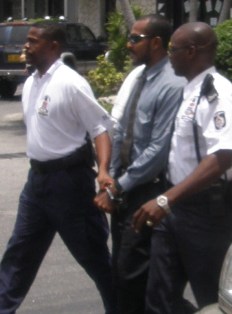
Crown re-opens murder trial
 (CNS): William McLaughlin-Martinez faced trial for the second time for the murder of Brian Rankine-Carter today (Wednesday 6 April). The crown opened its case with a video link to its main witness, Jason Hinds, in Jamaica. Hinds, who pleaded guilty to being an accessory to murder, was given a three year sentence but was released early and deported before McLaughlin’s original 2009 conviction was overturned on appeal. Before a jury of ten women and two men, Hinds recalled the events of the night of the murder in May 2008, when he says McLaughlin-Martinez killed Rankine in a frenzied attack with a machete and another sharp tool.
(CNS): William McLaughlin-Martinez faced trial for the second time for the murder of Brian Rankine-Carter today (Wednesday 6 April). The crown opened its case with a video link to its main witness, Jason Hinds, in Jamaica. Hinds, who pleaded guilty to being an accessory to murder, was given a three year sentence but was released early and deported before McLaughlin’s original 2009 conviction was overturned on appeal. Before a jury of ten women and two men, Hinds recalled the events of the night of the murder in May 2008, when he says McLaughlin-Martinez killed Rankine in a frenzied attack with a machete and another sharp tool.
Telling his version of events for the second time the crown witness told how he and Martinez had met Rankine at the eastern star bar in east end and how he had agreed todrive them into George Town in his company work van.
Describing what wasbelieved to be a drug deal that had gone wrong, Hinds said that when they arrived in George Town, Martinez attacked Rankine, chopping him with the machete in what felt "Like a nightmare. He said he had tried to stop Martinez by pulling him off Rankine but he failed and when he felt a tool in Rankine’s hand he went back to the van in fear.
He told the court how he drove Martinez to various locations to dispose of the victim’s clothes and possessions, as well as the murder weapon before he took him home.
The two men were arrested the next morning after witnesses reported seeing the van shortly before they found the naked mutilated body of Rankine in McField Lane, George Town.
According to the crown, Hinds gave a full account to police soon after his arrest, saying that Martinez was the killer and he had helped him dispose of the evidence. Solicitor General Cheryl Richards told the jury that other witnesses and evidence would be presented during the trial that supported Hinds’ account.
Mark Tomassi, Martinez’ attorney, is expected to cross examine Hinds this afternoon and will present the defense position that Hinds, not his client, was the murderer.
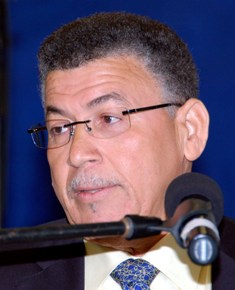
Mac turns down UN invite
 (CNS): The Cayman Islands’ premier has turned down an invitation to host the United Nation’s Special Committee on Decolonisation annual seminar here, his office revealed on Tuesday. Despite a release from the United Nations stating that the meeting would be held in Cayman next month, officials from the premier’s office said that McKeeva Bush had written to committee chairman, Francisco Carrion-Mena, on Tuesday morning stating that it would not be possible for his government to host the meeting. Although no reasons have been given as to why Cayman is refusing the invitation, officials said the CIG had never agreed to have it here in the first place. The UN “had jumped the gun” when it said the meeting would be held in Cayman, officials added.
(CNS): The Cayman Islands’ premier has turned down an invitation to host the United Nation’s Special Committee on Decolonisation annual seminar here, his office revealed on Tuesday. Despite a release from the United Nations stating that the meeting would be held in Cayman next month, officials from the premier’s office said that McKeeva Bush had written to committee chairman, Francisco Carrion-Mena, on Tuesday morning stating that it would not be possible for his government to host the meeting. Although no reasons have been given as to why Cayman is refusing the invitation, officials said the CIG had never agreed to have it here in the first place. The UN “had jumped the gun” when it said the meeting would be held in Cayman, officials added.
In his letter to the UN committee’s chair the premier reportedly offered his appreciation and gratitude for the invitation to host the annual meeting but turned it down without explanation.
The UN had released the information at the weekend indicating that the Cayman Islands had been selected following consideration of a number of factors in selecting the venue, including the political situation and logistics of several countries in the Caribbean. CNS has contacted the UN Decolonisation Committee to ask why it believed the CIG had already accepted the invitation and where the apparent miscommunication occurred and is awaiting a response.
The news that the meeting was planned to be held here had received a warm welcome from local activist group, the People for Referendum, which pointed to the importance of holding these meetings in the remaining colonies or non-self governing territories (NSGT).
The local group, which supports the idea that the Cayman Islands should move away from its current colonial status, said the matters discussed by this committee directly relate to the governance relationship between the territories and their respective administering power. The group said that holding seminars in the territories helps to educate the people about the governance options that the UN resolutions obligate all administering powers make available to the people in the territories.
The group said the decision not to hold the committee’s seminar in the Cayman Islands after all will deprive Caymanians of a valuable educational opportunity on governance. “Whether we like it or not, in 1945 and again in 1960 it was the UK that put the Cayman Islands on the UN Non-Self-Governing Territories list; the UK was one of the six member states that drafted the establishment of the UN Special Committee on Decolonisation and they also drafted the governing rules between the Administering Powers and Non-Self-Governing Territories,” the PFR said.
“One of these rules requires annual reports on each territory; these annual regional seminars are part of that reporting process when each territory’s government, civil society organizations and individuals have an opportunity to talk with the members of the UN.”
The group added that it was still important that Caymanians understand how their future is being discussed at these multinational meetings and that the public exercise their right of free speech.

Close Bros faces $22m suit
 (CNS): A writ filed in Grand Court on behalf of the joint official liquidators (JOLs) of the various Grand Island Funds, which collapsed in 2008, seeks to recover more than $22 million from the fund administrators, Close Brothers Ltd, and one of its employees. In the statement of claim Nick Freeland and David Walker say that the defendants failed to properly carry out their duties as administrators by ignoring obvious signs of fraud. The liquidators claim that the administrators failed to report Robert Girvan, the funds’ director and sole trader, who was convicted on 21 counts of theft and money laundering, despite many obvious red flags that should have alerted them to his illegal activities.
(CNS): A writ filed in Grand Court on behalf of the joint official liquidators (JOLs) of the various Grand Island Funds, which collapsed in 2008, seeks to recover more than $22 million from the fund administrators, Close Brothers Ltd, and one of its employees. In the statement of claim Nick Freeland and David Walker say that the defendants failed to properly carry out their duties as administrators by ignoring obvious signs of fraud. The liquidators claim that the administrators failed to report Robert Girvan, the funds’ director and sole trader, who was convicted on 21 counts of theft and money laundering, despite many obvious red flags that should have alerted them to his illegal activities.
“By reason of their failure to carry out their duties as administrators or to follow their own internal policies and procedures, they failed to discover and so alert the other directors of the funds, the auditor or the regulatory authorities of the Cayman Islands that the funds were being managed by Girvan as a Ponzi scheme,” the JOLs’ lawyers say in the writ.
They present an exhaustive list of opportunities in the 42 page claim, which they say Close Brothers Cayman Limited (CBCL) and John Sutlic, who was a director of the fund and CFO at the firm, ignored. Despite the catalogue of discrepancies, the administrators continued to issue net asset values for the funds, the JOLs state, accusing them of negligence and recklessness.
According to the JOLs, the administrators simply accepted at face value what Girvan told them and the forged documents he sent, even though no reputable bank would produce statements with such obvious errors. The JOLs claim that as early as July 2003, less than six months after the first fund was established, the administrators were being sent very clearly false documents by Girvan. The false bank statements being sent to CBCL were picked up by an employee, who noted the significant discrepancies and alerted other people at the firm in an email of the need to get originals directly from the bank.
“It is not known what investigation, complete or otherwise, was in fact carried out,” the JOL claim states. “Had a proper investigation been carried out, the fact that Girvan was producing forged statements would have been discovered in July 2003.”
Despite this and other warnings, however, and the fact that the documents were so apparently false, Close Brothers continued for another five years to accept the doctored statements and issued fund values based on the forgeries, the liquidators say in the statement of claim.
Girvan was not arrested until 2008, when the real and substantial losses the funds had suffered through trading, further compounded by Girvan’s criminal attempts to cover up the losses, were revealed. He was accused of stealing more than $19 million and was sentenced to eight years in jail after pleading guilty. Girvan was able to commit the acts of theft and money laundering, the JOLs say in the writ, because of the failures of the defendants.
Aside from failing to pick up on Girvan’s poor attempts at forgery, allowing him to co-mingle money from the funds into other accounts, and failing to keep proper books of account, the JOLs claim that Close Bros had “at all material times … irreconcilable conflicts of interest” as a result of the firm’s existing relationship with the promoter of the funds, Naul Bodden, and that affiliates of CBCL were in investors in the various Grand Island Funds.
As a result of the “breach of fiduciary duty”, the JOLs claim that Close Brothers and Sutlic are liable for the losses and the money which was wrongfully transferred. They also say the administrators are liable for the redemption payments that were made based on the false net asset values they produced from the obviously false statements given to them by Girvan, which shouldn’t have been paid. The JOLs say the administrators should also pay back the fees, commissions and other charges they were paid as they were not properly earned.
In total the JOLs are seeking more than $22 million from the firm as well as costs, interest and damages.
The JOLs have confirmed that the litigation remains in the early stages, with the writ filed in late November, and so far no settlement has been reached. “However, we are always willing to consider sensible and realistic proposals that would achieve an acceptable outcome for the funds shareholders,” Nick Freeland told CNS.
Managing Director of Close Brothers, Linburgh Martin, acknowledged the litigation between the Joint Official Liquidators of the Grand Island Funds and Close Brothers (Cayman) Limited (CBCL) and various other parties in Cayman but denied culpability.
“We believe that CBCL and its employees acted appropriately in servicing the funds and that we have a solid defence to the various allegations against us in this unfortunate matter,” Martin added.
He also noted that the recent sale of CBCL and its Cayman affiliates was not related to the Grand Island Funds case.
“The sale follows the recent sale of our Group’s ‘UK Offshore’ business in the Channel Islands, as the Group concentrates on expanding its core UK asset management business. We are confident that CBCL’s Cayman business will go from strength to strength and the sale will prove to be an excellent strategic move for our business,” Martin told CNS.
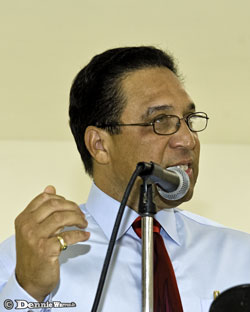
Crime plan falls short
 (CNS): The leader of the opposition says people will be disappointed with the long awaited national crime strategy because, despite being a well researched document, it does nothing to address the immediate issues facing the community. Alden McLaughlin said government must take ownership of the current rise in violent crime. The new report, which has been in the works for well over a year, has some excellent proposals to tackle the issue of criminality in the long term, he revealed, but it falls short of what people are expecting when it comes to protecting them from violent robbers. With criminals getting away with daylight robbery – literally — Cayman has to change its approach to policing, the PPM leader has said. (Photo Dennie WarrenJr)
(CNS): The leader of the opposition says people will be disappointed with the long awaited national crime strategy because, despite being a well researched document, it does nothing to address the immediate issues facing the community. Alden McLaughlin said government must take ownership of the current rise in violent crime. The new report, which has been in the works for well over a year, has some excellent proposals to tackle the issue of criminality in the long term, he revealed, but it falls short of what people are expecting when it comes to protecting them from violent robbers. With criminals getting away with daylight robbery – literally — Cayman has to change its approach to policing, the PPM leader has said. (Photo Dennie WarrenJr)
Speaking at a public meeting in the Bodden Town district hosted by his fellow MLA Anthony Eden, McLaughlin said that the National Security Council’s crime strategy report, which has finally been revealed to members of the Legislative Assembly, contains import information and potentially long term solutions, but no immediate solutions to protect people from the surge in robberies.
The document, which has not yet been adopted by Cabinet, addresses the root cause of crime and the social issues that have fuelled its increase. The report, he said, was a comprehensive look at failures where children are concerned, programmes that have not worked, and a lack of rehabilitation in the prison system, all of which he said were important.
“The report deals with the causes of crime, and there is much that is good in the report, but in the short term we have to deal with issues that confront people on an almost daily basis,” McLaughlin stated. With four bank robberies in just over one year, none of which have been solved, the people were scared and the robbers were facing no deterrent as they were being rewarded for their crime, he added. “We need an immediate plan to deal with the crime that is facing us every day,” McLaughlin told the district audience.
He said the most recent statistics from the RCIPS showing a decline in overall crime did not reflect the reality of how people felt, and with a more than 200% increase in robberies the overall reduction did not instil confidence as it was these crimes that were frightening people.
“We have to change our approach to the way we police and how we manage our security,” McLaughlin told the audience at the district meeting. “I am not an advocate of arming police but it is clear at moment there is no deterrent, especially when bank robbers are getting away with it.”
He said the question had to be how can the safety of customers and staff at a bank be ensured if someone can walk up to a security guard and put a gun to his head and rob the customers?
“We have to accept Cayman has changed,” he added. Echoing the sentiments of the community as a whole, he said it was only a matter of time before somebody gets seriously hurt or killed during a robbery.
The immediate problem of crime had to be addressed through policing, McLaughlin said, adding that law enforcement is down to two fundamental things: one is resources and the other expertise to deal with detection. “Somewhere we are failing,” he said. “The current government will not own the problem and it keeps pushing the issue on to the governor.”
He was not suggesting a PPM government could have resolved it overnight, he said, “but we wouldn’t have stopped pushing to try and address the short term issues.”
Crime is nothing new, he noted, but said Hurricane Ivan was the watershed for the Cayman Islands when it came to social behaviour and crime. In the wake of the disaster the island witnessed lawlessness and criminality never seen before and it had been difficult to get the genie back in bottle.
He pointed out that the previous government had focused on addressing crime, especially with resources, despite it being the responsibility of the governor. With the introduction of the National Security Council under the new constitution, he said the elected armed of government now had more power as the government was bound to take the council’s advice.
“The government is playing down its role on national security so it can avoid accepting responsibility,” McLaughlin said.
Murder retrial still in limbo
(CNS): A second attempt to begin the retrial of William Martinez-McLaughlin for the murder of Brian Rankine-Carter failed Monday morning despite the selection of a new jury. Following legal complications, the judge ordered an adjournment until Wednesday when the ten women and two men are expected to hear evidence from the crown against the accused man, who has now been in custody for almost three years. Martinez-McLaughlin, whose conviction for Rankine’s murder was overturned last August, has remained in prison since he was first arrested for the crime in May 2008. He was convicted by a jury in July 2009 but a year later the guilty verdict was overturned by the Court of Appeal, owing to a misdirection by the trial judge.
Efforts by the prosecution to re-try the defendant failed in January this year when closed door legal arguments exhausted the allotted trial timetable. Further legal issues again halted proceedings this morning before Justice Charles Quin sent the newly selected jury away until 6 April. It took around 40 minutes and several challenges before twelve members of the public who were not connected in some way to the defendant, the trial witnesses, or the lawyers involved in the case were sworn.
During the original trial the crown had relied upon a combination of forensic evidence, expert witnesses and a key witness, who was later convicted as an accessory to the murder.
Jason Hinds, who testified that he was with McLaughlin-Martinez on the night of the killing and saw him attack the twenty-year-old Rankine-Carter, is a Jamaican national who was deported by authorities here after he had served part of a three year sentence for his part in the crime. The defence, however, has maintained since the original trial that McLaughlin-Martinez was the accessory and Hinds the murderer.
The murder was described at the time by the police as particularly brutal, as the young male victim sustained more than 48 wounds during what appeared to be a frenzied attack with a machete.
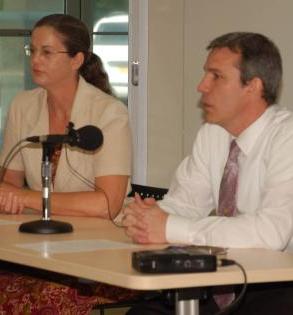
Commissioners stand firm
 (CNS): Despite the damning public criticism of the members of the Constitutional Commission by the country’s leader, the commissioners will be going ahead with their public meetings in order to continue their research into how government and the constitution are working, how politicians are advised and what changes people want to see, if any, to the constitution to achieve the goal of good governance. Although Premier McKeeva Bush, derided comments made by Wil Pineau and Julene Banks about the advisory district council law and the current North Side advisory council, the team is starting its public meetings in that district as planned, unperturbed by the comments.
(CNS): Despite the damning public criticism of the members of the Constitutional Commission by the country’s leader, the commissioners will be going ahead with their public meetings in order to continue their research into how government and the constitution are working, how politicians are advised and what changes people want to see, if any, to the constitution to achieve the goal of good governance. Although Premier McKeeva Bush, derided comments made by Wil Pineau and Julene Banks about the advisory district council law and the current North Side advisory council, the team is starting its public meetings in that district as planned, unperturbed by the comments.
So far, the commissioners have not responded publicly to Bush’s criticisms but say they have written to the governor and will make that correspondence public shortly.
Speaking inthe Legislative Assembly last month, Bush said their poor performance was embarrassing as they had “gotten so far adrift” from their “real role”. He accused them of misusing their position and trying to influence public opinion.
The premier said he had asked the governor to speak with the commissioners and he was encouraging them to speak with the attorney general to be better “schooled in their role and functions” as he accused them of trying to frustrate his administration. Bush was particularly angry about the commission’s comments regarding the law recently passed by government on the make-up of advisory district councils, which provides for the councils to be appointed by government. The commissioners said that the existing district council in North Side, which was elected by constituents, was closer to what had been envisioned by the commission.
However, Bush criticised the commission’s goal to canvas public opinion and said it was a delicate undertaking for a body such as a Constitutional Commission and that their comments were "blatantly partisan”. He said they were indicating their support for the MLA for North Side while opposing the UDP government and were encouraging the people to adopt the same view.
Unperturbed by Bush’s accusations, the commissioners will be starting the series of public meetings in North Side on Thursday evening at the civic centre. The commissioners want to engage the wider community in each district in public discussions on all constitutional matters. The commissioners say the meetings will allow members of the public to ask questions about, and gain a better understanding of, the constitution as a document that affects their daily lives.
“The public is encouraged to exercise their freedom to become better informed and more involved in the development of constitutional matters. Every voice is valuable in the interpretation of constitutional advancements,” the constitutional officials said in a release.
Meeting dates and times have been confirmed in the following districts:
Thursday, 7 April, 7-9pm, North Side Civic Centre
Thursday, 14 April, 7-9pm, East End Civic Centre
Thursday, 5 May, 7-9pm, Bodden Town Civic Centre
Thursday, 19 May, 7-9pm, South Sound Civic Centre
Meetings are planned for the districts of West Bay and the Sister Islands in June.
For more information visit the Constitutional Commission website.
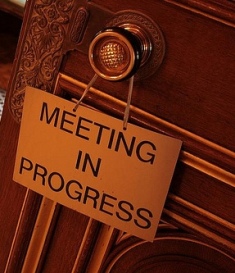
Public boards need rules
 (CNS): People who serve on government boards for public authorities where they also have business interests are being called into question. There are currently a number of boards where members face potential conflicts of interest, raising concerns in the community. How boards are appointed, how political they should be and where the line is drawn between experience and business interest are topical issues that have been raised by the Commission for Standards in Public Life. North Side MLA Ezzard Miller says that what is needed is a proper set of rules and standards to govern how boards are selected and how they operate.
(CNS): People who serve on government boards for public authorities where they also have business interests are being called into question. There are currently a number of boards where members face potential conflicts of interest, raising concerns in the community. How boards are appointed, how political they should be and where the line is drawn between experience and business interest are topical issues that have been raised by the Commission for Standards in Public Life. North Side MLA Ezzard Miller says that what is needed is a proper set of rules and standards to govern how boards are selected and how they operate.
Recent changes to the board overseeing the airport on Grand Cayman were questioned by a number of CNS readers, who asked whether it was ethical to have a chair who was an airline agent and one member whose firm handles the security at Owen Roberts International. However, this is by no means the first or only instance where members of the more than the one hundred government boards and other public authority councils may be conflicted. Historically, the membership on boards, such as planning, the public transport board, those relating to business licensing and immigration, among others, have all been called into question.
The Commission for Standards in Public Life recently raised the issue of qualification of board members and the need for more technical expertise in its latest report to the Legislative Assembly. Miller also says there needs to be a proper set of rules that define how the boards are selected and run. Furthermore, he stated that people who are appointed to boards often take the money but don’t take on the responsibility that serving requires.
“People who have pecuniary interests or government sub-contracts should not be sitting on public boards,” the independent MLA said, adding no one should put themselves in positions where conflicts of interest arise. “But the bigger problem is that there are no common rules about how boards function and in some cases members are taking their stipend and then they are allowed to ‘goof off’. It’s time we established set of standards and expectations of what is required of members.”
The question of the politicisation of boards has also caused debate in the community. The premier has frequently stated that since boards work for government and implement government policy they should be government supporters and not be working against the elected administration.
On a number of occasions he has publicly criticised boards for dragging their feet and has stated that were he able to have more control, in particularly of the Port Authority, the cruise ship docks would already be under construction. When Bush was leader of government business in the previous UDP administration, he also served as chair on the Port Authority board.
The Commission for Standards in Public Life said in its February report that it would take an “in depth look” at statutory board appointments and how “conflicts of interest or corruption”, perceived or real, could be avoided. It said it was also interested in how qualified members were to make the best decisions falling within their remit. The CSPL, which was created under the new constitution as a watchdog for all public servants, is just one body examining the way people involved in public life behave as governance moves in to the era of transparency.
The new Anti-corruption Commission and the anti-corruption law cover statuary boards and councils. Last year the attorney general advised all those serving on government and statutory boards to pay close attention to potential conflicts of interest.
The law mandates that any public officer or MLA that has any financial interests, direct or indirect in the company or partnership or similar entity needs to make a written disclosure. “Any public officer or MLA who fails to disclose an interest as stipulated by the law and who proceeded to vote or otherwise takes part in the proceedings of the entity relating to such interest commits and offence and could face prison time of up to five years if convicted,” Samuel Bulgin explained.
Although the Anti-corruption Commission has been in place for more than a year, its members have said nothing at all publicly about its work or if it is currently carrying out any investigations. For some twelve months the chair, who is the police commissioner, has been saying that a public education campaign will soon begin. As yet, however, no dates have been set for public meetings or details of the campaign revealed. The commission was established under the anti-corruption law and not the new constitution, but the point of public contact for the body was recently placed under the Constitutional Secretariat and a hotline created for people to report cases of potential corruption.
Missing man may still be tried
(CNS): The man who is accused of being the mastermind behind the bungled kidnapping for ransom, the first ever such crime in the Cayman Islands, may still be tried, despite not being here. The prosecution service has already been granted an order to try Richard Hurlstone in his absence. Hurlstone absconded from the jurisdiction while on bail during the trial preparation, which should have seen him in the dock alongside Allan Kelly and Charles Webster, who were found guilty of the crime on Wednesday. A Caymanian status holder, Hurlstone has reportedly fled to Honduras, his country of origin, but Cayman does not have an extradition treaty with that nation.
Although Hurlstone was not present during the actual kidnapping of Tyson Tatum, several witnesses testified during the recent trial that he was the ringleader. During the sentencing on Wednesday of Kelly, Webster and Wespie Mullins, who were all convicted of the crime, the trial judge noted that had Hurlstone been present at the trial and found guilty he would, as the ringleader, have been given a sentence of at least fifteen years. The judge said that with the order in place it was now up to local prosecutors to decide if he should be tried in his absence. “Hurlstone was indeed the mastermind behind the plot,” Justice Harrison said. “Unfortunately, Hurlstone is not here.”
Mullings, who pleaded guilty to the kidnapping prior to the trial of Kelly and Webster, was the first person to tell police that the entire abduction and blackmail plot was cooked up by Hurlstone, the victim’s brother-in-law, who before the ill-fated scheme had worked in the family business.
During the trial the court heard that Hurlstone had wanted to start "a new business of kidnapping for money” in the Cayman Islands and his first victim was going to be his wife’s brother. It also heard how it was Hurlstone who had given the phone to the victim’s mother, Angelique Tatum, which the kidnappers called her on when they had abducted Tyson Tatum to make their ransom demands.
Mullings, Kelly and Webster and other witnesses, including those who had been asked to join the scheme but were in the end to play no part, all spoke of attending meetings with Hurlstone, who they said had come up with the plan. The three men were supposedly offered $25,000 each to take part in the joint criminal conspiracy.
Tatum also said during his evidence at Kelly and Webster’s trial that his captors had revealed that he had been abducted in connection with a deal that had gone wrong between his father and Richard Hurlstone.
In the end, despite the threats, Angelique Tatum had contacted the police immediately after she realized that her son had indeed been kidnapped. Tyson, despite being bound and gagged and tied to a chair, made his escape when the kidnappers left him alone in the North Side house where he was held.
All of the kidnappers were rounded up soon after the foiled crime at Owen Roberts International airport. However, following a successful bail application, 32-year-old Hurlstone disappeared before the trial date. Although under curfew and made to surrender his passport, Hurlstone’s disappearance was discovered at the beginning of the new year when he failed to turn up for a court appearance.
It was discovered that he had not reported to police since the beginning of December and that his home had been locked up and his personal possessions sold on a local classified website.